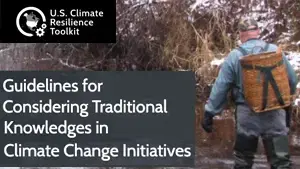 Guidelines for Considering Traditional Knowledges in Climate Change Initiatives is an informational resource for tribes, agencies, and organizations across the United States interested in understanding traditional knowledges—or TKs—in the context of climate change.
Guidelines for Considering Traditional Knowledges in Climate Change Initiatives is an informational resource for tribes, agencies, and organizations across the United States interested in understanding traditional knowledges—or TKs—in the context of climate change.
Tribes, agencies, and organizations can use this guide as a framework to increase understanding of issues relating to access and protection of traditional knowledges in climate initiatives.
The guidelines are intended to meet multiple goals. First and foremost, the guidelines are intended to be provisional. They are intended to:
- Increase understanding of the role of and protections for traditional knowledges (TKs) in climate initiatives:
- Provide foundational information to federal agencies on intergovernmental relationships and science when engaging tribal and indigenous peoples in federal climate change initiatives; and
- Provide foundational information on the role of TKs in federal climate change initiatives.
- Provide provisional guidance to those engaging in efforts that encompass TKs:
- Establish principles of engagement with tribes on issues related to TKs; and
- Establish processes and protocols that govern the sharing and protection of TKs.
- Increase mutually beneficial and ethical interactions between tribes and non-tribal partners:
- Examine the significance of TKs in relation to climate change and the potential risks to indigenous peoples in the U.S. for sharing TKs in federal and other non-indigenous climate change initiatives;
- Guide the motivation, character, and intent of collaborative climate initiatives undertaken between government agencies, research scientists, tribal communities, and TKs holders;
- Provide specific measures that federal agencies, researchers, tribes, and TKs holders can follow in conceptualizing, developing, and implementing climate change initiatives involving TKs; and,
- Promote the use of TKs in climate change initiatives in such a way as to benefit indigenous peoples and promote greater collaboration between federal agencies and tribes and increase tribal representation in federal climate initiatives.
Guidelines is part of the U.S. Climate Resilience Toolkit.
Click here to view the resource.




